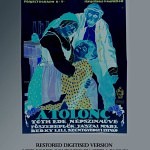Translator’s monologue
He was dead about ten years before I even heard his name. Let me rephrase that: I have seen his name printed in Russian, on a photocopied page of the Soviet-era literary magazine called Moskva (Moscow), ten years after his death in Montreux, Switzerland. Then I’ve read from those pages that novel he wrote in the 1930s while living in exile – an émigré as they liked to say – in Berlin. But he wrote it in Russian, though he assisted later the American translator who created the English version of it. He helped him and he kind of supervised him, the translator told me in the nineties. Just as his son, who after the father’s death supervised and forced the publishers worldwide to review and “correct” their earlier translations from Russian originals according to the latest and most authentic(?) English version of his works. Talk about language fanaticism…
When those photocopied pages in Russian were smuggled for me through the border, and which I still carry with me across oceans and continents with my handwritten notes made about 35 years ago, I was living as an outcast in my native land. According to the ruling communist party’s phraseology I was a Romanian of Hungarian ethnicity and because it was alleged that my ancestors cruelly oppressed and exploited the aboriginal Romanian population (which inhabited the land from time immemorial as a result of the gayish cross-over of the Roman emperor Traianus and the Dacic king Decebalus, as it was taught for the kindergartens), so I was just getting back what they endured for centuries, and now, finally – according to them – the order was restored in the universe, since they ruled and could do to us anything they pleased to. Above all they liked and still enjoy stripping away our ethnic, linguistic and national identity. And the past. (Note for the Anglo-Saxons: on the European continent people have citizenship that happened to them without asking their wish… and they have also a “nationality” which in most of the European languages is related to the mother tongue, the “mother” culture, the ancestors and traditions… the “ethnic background” as you like say, but over there anything that starts with ethno- has a bad connotation since the ethnic cleansing and your interpretation of it as *tribal*.) So, officially, I wasn’t even a Hungarian. Just some kind of. Funny, eh? – would joke my Canadian compatriots today.
And the man whose prose I was reading and – horribile dictu – translating later into Hungarian(!) was this crazy entomologist and butterfly collector (lepidopterologist), who succeeded to upset all the prudish American establishment with his genially written pseudo-erotico-psychological thriller titled – Lolita. This one he wrote in English, since he was (at least) bilingual since his early childhood, thanks to his anglomaniac (anglophile?) father. His name is (or was?) Vladimir Vladimirovich Nabokov. Владимир Владимирович Набоков.
I am not a fan of bugs, I was constrained to live and work in a small region of Eastern Europe, not allowed to travel anywhere – it was like a huge prison without walls, and suddenly I was given a task to translate the novel about the chess player (geez, I don’t even play chess, whisky, tango, foxtrot) who goes mad. Literally. A Russian crazy chess player that travels all around the world for tournaments. And I, the prisoner of the most closeminded authoritarian national-communist (Naco?) regime, having denied even my own identity as a Hungarian… I was supposed to translate Vladimir Vladimirovich’s novel into Hungarian? Where was the international outrage?
In retrospective, I had to confess: nobody gave a shit. And rightly so. Not then and not now. I was told I did a decent job, and now Hungarian readers can enjoy the novel in their mother tongue, experiencing something similar to what Russian readers go through. Or the closest possible, I think. I have to believe this, otherwise I should have burned my manuscript – like other crazy Russian writers did sometimes. For instance Gogol, my other favourite.
There was no such idiocy back then as what we call today “identity politics”. Which is a big pile of shit by any means. I don’t care what is your colour. Translations, literary translation is not based on your skin colour. It is based on knowledge, sweat, lots of sweating and sleepless nights, an obsessed search for that one and only right word in the sentence, for that special phrase that would affect your readers (since the readers of a translated work are your readers, too!) in the way the original author intended to affect his readers in their original language, which you are lucky enough to understand and feel to be able to attempt a translation from it. Once a Hungarian poet said translating verses is like trying to dance while all tied up in ropes…
Translating is part philology, part being a sensitive reader, part being a walking dictionary, part being a writer and most importantly being brave. Believing in one’s own ability to become a literary and linguistic chameleon. And to dismiss identity politics as the biggest shit of the century. Right next to cultural appropriation and cancel culture. All lives matter – except the idiots!




